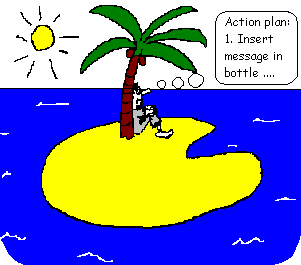This post focuses on the benefits for law firms of short term action plans in tough times. First, however….some background dialogue —
Even today in spite of the drastic changes taking place within so many firms, some attorneys claim that practicing law is not a business but a profession. And, some of these folks, unfortunately, have had the seniority to dilute or completely override others’ efforts to implement smarter business practices in their firms. Put another way, far too many so called “leaders” have helped set their firms up for failure in times like these. How? Because they’ve refused to accept that what made a firm successful twenty years ago is far different than the business savvy needed to successfully lead and manage today’s law office. For a law office consultant there is nothing tougher than witnessing the “veto” power of a few squash the progressive efforts of those who realize their firm’s survival is as dependent on smart business practices as it is on top legal skills.
Practicing law is absolutely both a profession and a business. I believe among the silver linings arising out of today’s economic mess for our great profession will be: no more second class citizenship status for the application of smart business practices; no more “to be a real lawyer you must be a litigator” attitudes; no more will attorneys who oversee firm administration have to do so without fair compensation and; perhaps most importantly, firms will know that everyone from the most senior attorney to the newly hired file clerk must participate in the practice of smart business skills. Attorneys and staff who refuse to change with an attitude of “let someone else worry about it” will no longer be tolerated regardless of their title or seniority. This realization in many firms is long past due.
With smart business practices in mind, the remainder of this post focuses on the value of short-term action plans. The odds for achieving our objectives increase significantly when we make the time to create written strategic plans. They help us realize our dreams, successfully accomplish the “must do” tasks and they help us avoid becoming stagnated (and ultimately overwhelmed) by procrastination, fear of failure or unrealistic expectations that someone else will “take care of it.” The alternative is to keep wishing things were different while our chronic, unorganized and chaotic habits keep weaving their destructive threads into our lives.
While long-term plans are invaluable in helping ensure successful endings of “big picture” visions, during more challenging times short term plans for three months or less are well worth our efforts. These smaller “road maps” can be adapted and revised more quickly than longer-term plans and they help us keep a steady foothold so that we can move productively forward rather than stagnating or worse. (Click here to view the very simple beginnings – and sample only – of a three month action plan)
With so many unknowns about when and how our economy will heal, all the more reason to keep control in our professional and personal worlds. The fallout from procrastinating or expecting someone else to take care of us is more dangerous than ever in times such as these. We must act calmly, smartly, timely and deliberately. For some this means a change in attitudes, methods, systems, procedures, comfort zones and more in order to survive.
The use of action plans helps us stay in control so that we successfully achieve desired goals. Without the right “tools” to help remind us what we must do to, our best intentions all too easily get buried beneath a million other thoughts, tasks and distractions.
As lawyers, we know how to be resourceful and the value of digging as deep as necessary for solutions. Now is the time to dig deep within ourselves for the strengths within and to have the courage to do things differently. If we refuse to change, refuse to be apply the business of law and allow chaos to dominate, we greatly increase the odds for failure.
In closing, I truly believe as we look back years from now that some of the silver linings from today’s upside down world will be: (1) our profession survived admirably in spite of the hits it took and the naysayers who said we would not; (2) our professionalism and our excellent management and leadership skills have become the norm not the exception; and (3) our compassion and empathy for our clients’ tough times is more genuine and heartfelt than ever before. Put another way, our great profession will indeed emerge stronger and smarter than ever.
Former practicing lawyer Nancy Byerly Jones is a regular contributor to Lawyers USA in which this article was published. Nancy is the author of the ABA’s book “Easy Self-Audits for the Busy Law Office.” She serves as a law office consultant and solutions coach for attorneys and staff and businesses. Also, she serves as a certified mediator for employee/business disputes and family law matters. For more resources, information and contact information, please visit Nancy’s website at www.nbjconsulting.com.


Nancy Byerly Jones offers a compelling argument for implementing short-term action plans in law firms during challenging times. Emphasizing that law is both a profession and a business, she highlights the importance of adapting smart business practices to ensure a firm's survival and success. The call for progressive change and accountability at all levels is crucial. Her insights on strategic planning are a valuable guide for navigating tough periods effectively.
Many thanks for visiting NBJConsulting.com and for your thoughtful comments.
Too often we can get so over-focused on long range plans that we miss the huge value of creating shorter term strategies (and most importantly, moving forward with implementing them).